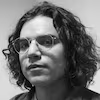Oppenheimer: Why was the father of the atomic bomb accused of working with the Soviets?
Even though the scientist was the mastermind behind the atomic bomb, he believed the second bombing was unjustified and made efforts to impede the advancement of the much more potent hydrogen bomb, resulting in an investigation on his political inclinations
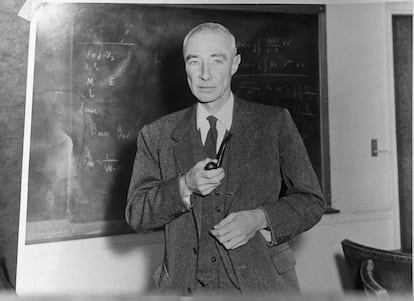
J. Robert Oppenheimer is the central figure in the most recent Christopher Nolan film, where he is portrayed by Cillian Murphy. The movie focuses on Oppenheimer’s significant contribution to the development of the atomic bomb during World War II and the subsequent controversy he faced when expressing concerns about the escalating arms race between the United States and the Soviet Union later in his life. Due to his political views and alleged associations with communist sympathizers, he became the subject of a government investigation, transforming from a celebrated scientist to a potential adversary of his own country.
Born in New York City in 1904, Oppenheimer displayed an early interest in science. Throughout his early career, he conducted groundbreaking research in theoretical astronomy, nuclear physics, spectroscopy, and quantum field theory. He also played a crucial role in establishing the American school of theoretical physics, which gained prominence in the 1930s.
Manhattan Project
On October 9, 1941, two months before the United States’ entry into World War II, President Franklin D. Roosevelt approved a program to develop an atomic bomb. In May 1942, James B. Conant, Chairman of the National Defense Research Committee and a former lecturer of Oppenheimer at Harvard University, invited him to contribute to fast neutron calculations. The U.S. Army subsequently established the Manhattan Engineer District, also known as the Manhattan Project, in June 1942. Leslie Groves, who had overseen the construction of the Pentagon, was appointed as the project’s director.
Despite Oppenheimer’s left-wing political views and lack of experience in leading large projects, Groves selected him to head the project’s secret weapons laboratory due to his profound understanding of the practical aspects involved in designing and creating an atomic bomb. Recognizing the need for security and cohesion, Oppenheimer and Groves decided to establish a secret research laboratory in a remote location. They chose a flat mesa near Santa Fe, New Mexico, which was the site of a former boys’ school. The Los Alamos Laboratory, also referred to as Project Y, was built there under the operation of the University of California. Its mission was to design and construct the first atomic bombs.
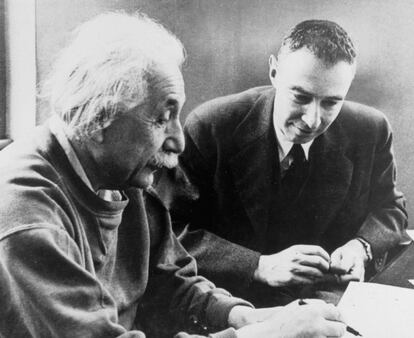
Although initially lacking expertise in large-scale administration, Oppenheimer quickly familiarized himself with the responsibilities, becoming a permanent resident of Los Alamos. Those who worked with him noted his mastery of all scientific aspects of the project and his efforts to mediate between the scientific and military personnel.
In 1943, the project’s development efforts shifted towards an implosion-type weapon, known as “Little Boy,” which replaced the earlier “Thin Man” design. On July 16, 1945, the first detonation of a nuclear weapon, code-named Trinity, took place in the Jornada del Muerto desert in New Mexico. Oppenheimer, who chose the name Trinity, was inspired by John Donne’s poetry. Witnessing the explosion, he recalled a verse from the Hindu scripture Bhagavad Gita, stating, “If the radiance of a thousand suns were to burst at once into the sky, that would be like the splendor of the mighty one.” He also later mentioned another verse translated as “I am become Death, the destroyer of worlds.”
Following the atomic bombing of Hiroshima on August 6, 1945, Oppenheimer expressed regret during an assembly at Los Alamos that the weapon had not been available earlier to use against Nazi Germany. However, he and many others involved in the project were reportedly upset about the second bombing in Nagasaki, as they did not view it as necessary from a military standpoint.
On August 17, Oppenheimer traveled to hand-deliver a letter to Secretary of War Henry L. Stimson, expressing his dissatisfaction and advocating for a ban on nuclear weapons. In October 1945, he had a meeting with President Harry S. Truman, which ended poorly after Oppenheimer stated that he felt he had “blood on my hands,” infuriating Truman. Following the meeting, Truman told Dean Acheson, his Undersecretary of State, “I don’t want to see that son-of-a-bitch in this office ever again.” However, Truman awarded Oppenheimer the Medal for Merit in 1946.
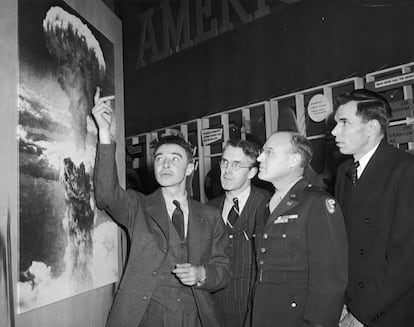
The FBI had been monitoring Oppenheimer even before the war due to his communist sympathies while working as a professor at Berkeley and his close associations with members of the Communist Party, including his wife and brother. On June 7, 1949, Oppenheimer testified before the House Un-American Activities Committee, acknowledging his past affiliations with the Communist Party and revealing that some of his students at Berkeley had been communists during that time.
Oppenheimer’s security clearance
On November 7, 1953, William L. Borden, a former executive director of Congress’ Joint Atomic Energy Committee, sent a letter to FBI director J. Edgar Hoover regarding Oppenheimer. Borden accused Oppenheimer of being “an agent of the Soviet Union” based on the government’s investigative dossier. The letter alleged that Oppenheimer had financially supported the Communist Party since April 1942, employed several Communists at Los Alamos, and worked against the development of the hydrogen bomb and postwar atomic energy initiatives.
Upon receiving this information, President Dwight D. Eisenhower was concerned about the possibility of these allegations being true and ordered that a “brick wall” be placed between Oppenheimer and atomic secrets on December 3. Lewis Strauss, the Chief of the Atomic Energy Commission, harbored long-standing resentment toward Oppenheimer due to his opposition to the hydrogen bomb’s development and a past humiliation before Congress. On December 21, 1953, Strauss informed Oppenheimer that his security clearance had been suspended after a re-evaluation of his security file. Oppenheimer chose not to resign and requested a hearing.
The hearing primarily focused on Oppenheimer’s past communist affiliations and his associations with suspected disloyal or communist scientists during the Manhattan Project. Although many prominent scientists, government officials, and military figures testified in support of Oppenheimer, Edward Teller and Leslie Groves testified against him. Teller’s testimony provoked outrage within the scientific community and resulted in his expulsion from academic science. Decades later, KGB archives revealed unsuccessful attempts by the Soviets to recruit Oppenheimer.
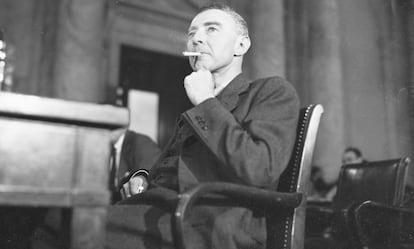
Oppenheimer’s security clearance was revoked one day before it was set to expire. However, on December 16, 2022, Jennifer Granholm, the United States Secretary of Energy, overturned the 1954 decision to revoke Oppenheimer’s security clearance. Granholm acknowledged the flawed procedure used by the Atomic Energy Commission in 1954, which violated their own regulations. Over time, additional evidence has emerged, shedding light on the bias and unfairness of the process Oppenheimer endured, further affirming his loyalty and patriotism.
Following the Manhattan Project, Oppenheimer continued to lecture, write, and work in the field of physics. He delivered talks on the history of science, the role of science in society, and the nature of the universe, emphasizing the importance of avoiding the use of nuclear weapons. Oppenheimer passed away in 1967.
Sign up for our weekly newsletter to get more English-language news coverage from EL PAÍS USA Edition
Tu suscripción se está usando en otro dispositivo
¿Quieres añadir otro usuario a tu suscripción?
Si continúas leyendo en este dispositivo, no se podrá leer en el otro.
FlechaTu suscripción se está usando en otro dispositivo y solo puedes acceder a EL PAÍS desde un dispositivo a la vez.
Si quieres compartir tu cuenta, cambia tu suscripción a la modalidad Premium, así podrás añadir otro usuario. Cada uno accederá con su propia cuenta de email, lo que os permitirá personalizar vuestra experiencia en EL PAÍS.
¿Tienes una suscripción de empresa? Accede aquí para contratar más cuentas.
En el caso de no saber quién está usando tu cuenta, te recomendamos cambiar tu contraseña aquí.
Si decides continuar compartiendo tu cuenta, este mensaje se mostrará en tu dispositivo y en el de la otra persona que está usando tu cuenta de forma indefinida, afectando a tu experiencia de lectura. Puedes consultar aquí los términos y condiciones de la suscripción digital.
